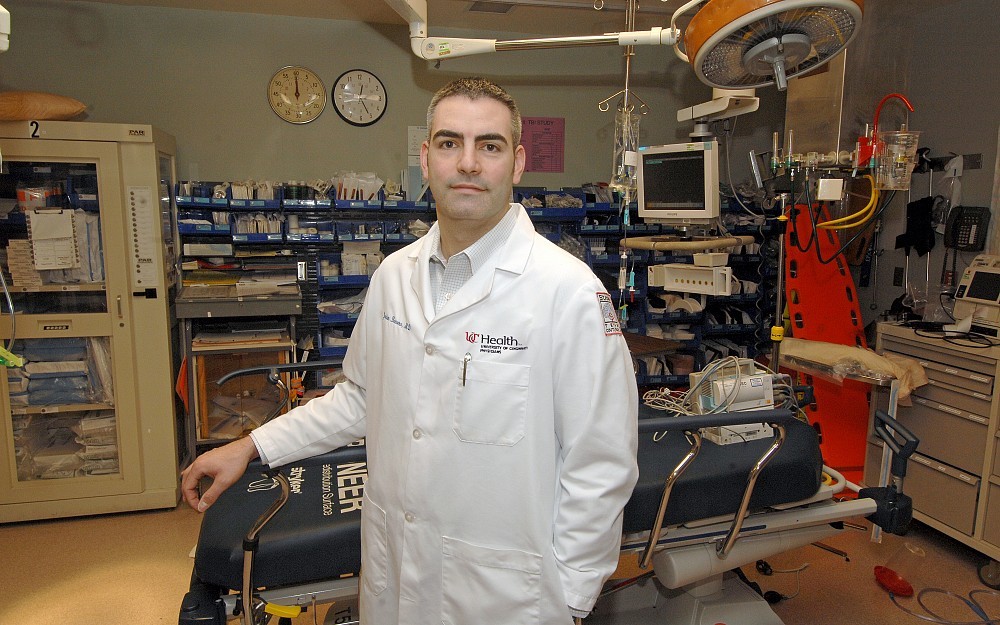
Progesterone Does Not Improve Outcome After Traumatic Brain Injury
CINCINNATIClinical trial results suggest that progesterone may not significantly improve outcomes in patients who have suffered a moderate to severe traumatic brain injury. University of Cincinnati Medical Center was one of 49 trauma centers involved in the National Institutes of Health-funded study.
The study, which was known as ProTECT-III (Progesterone for Traumatic Brain Injury, Experimental Clinical Treatment), was conducted between April 2009 and October 2013. UC researchers enrolled 85 of the 882 patients enrolled nationally, making UCMC the highest enrolling hospital. In the study, eligible patients were randomized to receive progesterone or placebo within four hours of sustaining head injury, with most injuries received in automobile crashes. Patients were treated with progesterone or placebo for 96 hours and then closely followed by researchers for six months.
Progesterone is a hormone that is associated with pregnancy but is also found in the brains of males and females. Animal studies have shown that progesterone may help improve recovery and reduce the extent of brain damage following traumatic head injury. Additionally, two single-center clinical trials showed decreased mortality and improved functional outcomes with progesterone treatment as compared with placebo.
Results published recently in the New England Journal of Medicine showed that 51 percent of patients who received progesterone and 55.5 percent of patients who received placebo had favorable outcomes. This suggested that progesterone did not significantly improve outcome after head injury. Researchers originally planned to enroll 1,140 subjects across the country but the trial was stopped following a safety review showing that early results suggested no benefit to administering progesterone treatment after head injury.
"We were disappointed to learn that progesterone was not as beneficial as we had hoped, said Jordan Bonomo, MD, assistant professor of emergency medicine at the UC College of Medicine and lead investigator on the trial in Cincinnati. "Its important that we develop new therapies to treat traumatic brain injuries, especially considering the large number of people who suffer from them.
The study, which was led nationally by researchers from Emory University in Atlanta, was conducted under exception from informed consent following federal Food and Drug Administration regulations. Because moderate to severe traumatic brain injury patients are generally not able to immediately provide consent to participating in trials such as ProTECT III, the study protocols allowed physicians to enroll patients after unsuccessfully attempting to reach a family member after 60 minutes of diligent effort. UC conducted extensive local community consultation and public disclosure activities about the trial before it started allowing local residents to opt out of the study if they wished. When a legally authorized representative was available, written informed consent was obtained before enrollment of the patient. For patients enrolled under the exemption from informed consent, patients or their legally authorized representatives were notified about enrollment by the study team as soon as possible and were asked to provide written informed consent to continue in the study.
The progesterone was administered by infusion after the patient was initially treated in the UC Medical Center emergency department. The treatment was generally well tolerated with similar rates of adverse events in both the progesterone- and placebo-treated groups. Vein inflammation, or phlebitis, was significantly more frequent in the progesterone group than in the placebo group. Episodes of phlebitis were frequently categorized as not serious and were self-limited. The rates of other serious and nonserious adverse events were also similar in the two study groups.
The study was funded by the National Institute of Neurological Disorders and Stroke (NS062778, NS059032 and NS056975) and was coordinated by the Neurological Emergencies Treatment Trials network (NETT). UC is one of 22 academic medical centers within NETT.
More than 2.4 million emergency department visits, hospitalizations or deaths are related to traumatic brain injury annually, and approximately 5.3 million Americans are living with disability from TBI. The aggregate annual cost of TBI in the United States now approaches $76.5 billion. Survivors of severe TBI typically require five to 10 years of intensive therapy and are often left with substantial disability. Despite decades of research, no pharmacologic agent has been shown to improve outcomes after TBI.
-30-
Related Stories
Department of Urology established at UC College of Medicine
July 8, 2024
The Department of Urology became the College of Medicine’s 24th academic department on July 1.
UC study: Brain organ plays key role in adult neurogenesis
July 2, 2024
The University of Cincinnati has published research in the Proceedings of the National Academy of Sciences that found the choroid plexus and cerebrospinal fluid play a key role in maintaining a pool of newly born neurons to repair the adult brain after injury.
Put down that beer; it's not a tanning lotion
July 1, 2024
The University of Cincinnati's Kelly Dobos joined WVXU's Cincinnati Edition to discuss what's fact and what's myth when it comes to sunscreen use, different kinds of sunscreen and a social media recommendation to use beer on your skin to help get a tan.
